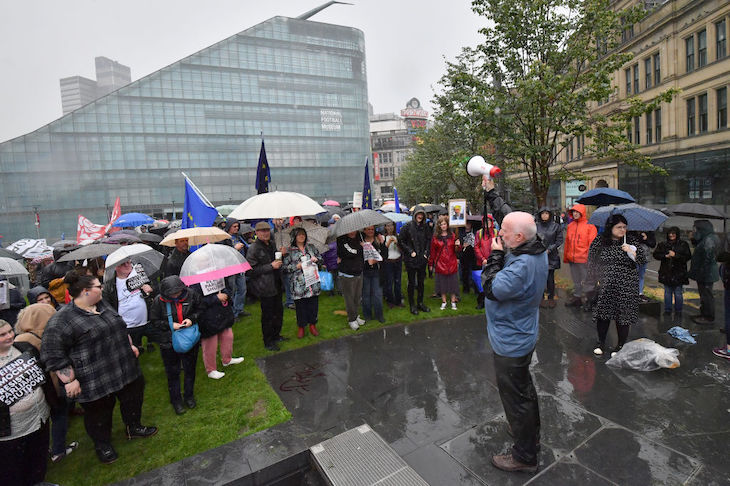On Saturday thousands of people across Britain demonstrated against Boris Johnson’s recently-announced prorogation of parliament.
Despite the heated response it provoked, proroguing parliament is a standard device which over the years has been employed by governments of all stripes. And as parliament was to be suspended for a few weeks during September and October in any case to allow the parties to hold their annual conferences, Johnson’s measure has reduced MPs’ time to prevent a no-deal Brexit by just a few days.
In the context of an unprecedented crisis, with the clock ticking down to October 31, the Prime Minister’s act of constitutional sharp practice nonetheless outraged those who demonstrated on Saturday. Those who took to the streets were, however, by no means all Rent-a-Mob, the kind of people who turn out rain or shine to sell Socialist Worker or the Morning Star. Although few were Leave or Tory voters, the protestors from Chester to Chichester were a relatively ecumenical bunch, mostly drawn from those Michael Frayn once described as ‘Herbivores’– ‘the radical middle-classes, the do-gooders’. This was progressive Middle England on the march and many were genuinely concerned about what they perceived as a Johnson attack on parliamentary democracy. And, as such, they were just the tip of an iceberg: all surveys suggest a plurality of Britons oppose prorogation.
In the fevered hothouse that is pre-Brexit Britain, Johnson’s act has however been transformed into a ‘coup’. Certainly, on Saturday there were plenty of banners which described Johnson and advisor Dominic Cummings as ‘fascists’, while comparisons between the Prime Minister and Hitler were not exactly in short supply. How far this was a pure rhetoric born of frustration or reflected how many protestors truly felt is hard to say.
What is clear, however, is that some amidst the demonstrators fervently did believe in accusations of a coup: Labour’s far-left. Coup-thinking is, in fact, an inherent part of the Corbynite imaginary, one which has antecedents in 1980s Bennism. And so, as soon as prorogation was announced John McDonnell tweeted: ‘Make no mistake, this is a very British coup’. McDonnell was referencing the title of the 1982 novel written by Chris Mullin. At that time Mullin was, like McDonnell and Jeremy Corbyn, a keen supporter of Tony Benn’s attempt to take over the Labour party. Mullin’s novel imagined what would happen if a Benn-led Labour party was elected to office: he believed the Establishment would destabilise and then bloodlessly overthrow it. Benn for one believed A Very British Coup outlined what might actually happen. Corbyn’s election as Labour leader has seen Mullins’ novel reprinted and it even inspired a mega game which featured at last year’s radical Corbynite festival The World Transformed. Fiction has become truth.
The popularity of Mullin’s novel is however just one feature of the paranoia that defines the contemporary far left. To them, Britain is experiencing a deep social and economic crisis, one which transcends Brexit, inaugurated by the 2008 financial crash and the austerity that followed. In their eyes global capitalism has abandoned any pretence of benevolence and has become a system of increasing immiseration for the many with only the 1 per cent benefitting. In this context, as Momentum once tweeted: ‘The centre ground is crumbling. It’s either socialism or barbarism’. From this perspective only a Corbyn-led Labour government committed to the creation of a transformative socialist economy will save Britain from a fascist answer to the crisis of neoliberalism.
They have seized on Johnson’s prorogation as the first sign of incipient fascism that has to be opposed by every means possible. That is why Laura Parker, Momentum’s national coordinator, called for protestors on Saturday to seize bridges and occupy roads and for others to demand all manner of civil disobedience. But only London, one of the few centres of Momentum significance, did anything like that happen, leading to a small number of arrests.
The reality is, few of those concerned about prorogation see matters in these Manichean terms. Nor are Britons comfortable with what McDonnell once approvingly described as ‘the democracy of the streets’: by 48:29 Survation found the public opposed calls for civil disobedience in response. Certainly, some of Corbyn’s keenest supporters are in danger of letting their radicalism get the better of them: MP Kate Osamor’s call for the abolition of the monarchy after the supremely popular Elizabeth II agreed – as convention dictated – to her ministers’ request for prorogation would not have gone down well with the wider public.
Labour’s far-left are genuinely excited by what they see as the opportunity Boris Johnson has presented them. Watching Owen Jones address crowds this last week was to see a man who thinks his moment of destiny has arrived. They imagine Johnson’s ‘coup’ has now clarified matters to the public: it really is Socialism or Barbarism. With Corbyn and Labour actually losing support in recent weeks, Britain’s mood looks rather more complex and less inclined to radicalism than ever it was. Indeed, there are some who believe prorogation was partly designed by Dominic Cummings to provoke opponents of a no-deal Brexit to outrage, a strategy with which he has previously enjoyed great success. In which case the Corbynite left and their imaginary onward march to a socialist future are doing exactly what he wants.
Steven Fielding is Professor of Political History at the University of Nottingham and is writing The Labour Party: from Callaghan to Corbyn.






Comments